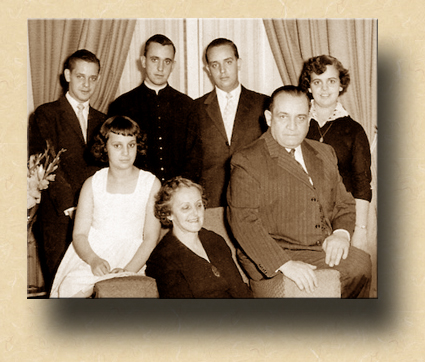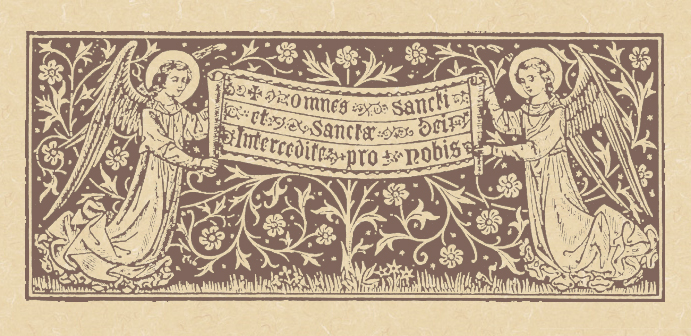What's Wrong with This Picture?
Is the Pope Psychologically Healthy?
FatherVenditti.com
|
6:14 PM 3/13/2017 — This post is actually a followup of a previous one, entitled “Do Sacraments Really Exist?” In point of fact, the original version of that article included these thoughts, but I edited them out at the time. With the advent of the Dubia, and the subsequent persecution of the four cardinals who issued it, I can no longer justify withholding these thoughts. In essence, the question raised by the Dubia can be synthesized as follows: Does the current Vicar of Christ believe there is such a thing as Divine Positive Law? Recent unguarded remarks by the Holy Father, the specific content of which are irrelevant, have motivated me to release these heretofore embargoed thoughts, resigned to letting the canonical chips fall where they may. To those who may reguard these thoughts as disrespectful, I have no response other than: "So be it."
An acquaintance of mine who is a psychologist believes he has Pope Francis all figured out: “His personality has all the hallmarks of someone who had a bad relationship with his father, determined to use his authority in a veiled way, masquerading as a kind of liberal leniency, to punish everyone who reminds him of father, unconsciously imitating every bad quality of his father that he grew up convinced he would avoid.” I am not a psychologist, so I have no way to evaluate his statement, though as a parish priest of considerable experience, I can testify to the fact that children who are emotionally abused growing up typically end up doing the same sort of thing in adulthood as their parents did to them.  There’s a photo floating around out there somewhere—a family photo of the Bergoglio family—and a very young Jorge Mario Bergoglio, a Jesuit scholastic at the time, is clearly not a happy young man. Call me presumptuous or conspiratorial, but I suspect that Jorge’s father was a very strict man, and that our pope is using his authority, subconsciously I hope, to lash out and destroy anyone and everyone in the Church who reminds him of the father. There’s a photo floating around out there somewhere—a family photo of the Bergoglio family—and a very young Jorge Mario Bergoglio, a Jesuit scholastic at the time, is clearly not a happy young man. Call me presumptuous or conspiratorial, but I suspect that Jorge’s father was a very strict man, and that our pope is using his authority, subconsciously I hope, to lash out and destroy anyone and everyone in the Church who reminds him of the father.
I have to confess that something along his thoughts came to my own mind just one week after Cardinal Bergoglio had been elected. I can't quote the exact day or occasion, but it was one of his first off-the-cuff comments in which he suggested a change in Canon Law by which the authority of the local bishop to supervise the activities of members of religious congregations ministering in the diocese would be whittled down, so that the “charism” of these religious priests could have their full effect. At the time, I remember speculating in my own thoughts that it was likely that, at some point in his early priesthood, a local bishop in Argentina had done something to curtail what he or his fellow Jesuits were doing which countermanded what the bishop had mandated for the faithful of his diocese, and that the newly elected Pope was still smarting about it even after all these years.
Then came his remark at the time he reformed the system of Papal honors—which, by definition, are only available to secular priests—in which he fulminated against priests who took pleasure in their fancy cars—I think I was actually behind the wheel of my Volkswagen at the time. The reforms, he said, were meant to combat the phenomena of men viewing their priesthood as a sort of “career,” and seeking to advance themselves in the “corporation” of the Church rather than serve. I remember asking myself at the time, “I wish he would specify where, exactly, he sees this happening today.” Certainly, this sort of thing went on in the past, before the abuse crisis, when the Church and her priests were fat, dumb and happy; but now? I began to wonder if this new Pope wasn't, perhaps, frozen somewhere in the '70s.
Then came the Year of Mercy, and the accompanying reform of the annulment procedures … which wasn't really a reform at all, but the canceling of one. Pope Saint John Paul II had reformed the whole process at the request—nee, the demand—of bishops around the world because the relaxing of the norms by Pope Blessed Paul VI had resulted in chaos and scandal. Paul VI knew it was necessary to incorporate the whole science of psychology into the process to reflect a more up-to-date understanding of how the human person views and makes commitments; but, unfortunately, his reform didn't stop there where it should have. John Paul's reform didn't undo what was essential about the Pauline reform, but instituted new rules to both ensure that tribunals were not inadvertently annulling valid marriages as well as provide local dioceses with the resources they needed to hear more cases and bring them to conclusion. Pope Francis was either ignorant of the situation that prompted the reform of John Paul II, or he simply refused to acknowledge it; but, for whatever reason, he presumed that the length of time required to bring cases to final judgment had something to do with a too-drawn-out administrative process and required appeals to a court of second instance. In reality, many cases drag on because the petitioner fails to provide necessary information to prove the punitive marriage invalid in a timely manner. Moreover, his requirement that no fees be levied has actually reduced the number of cases brought to final judgment because the most common ground sited in these cases—lack of due discretion—cannot be proven without the input of psychological professionals whose services do not come cheaply. A recent report from the Canon Law Society of America revealed that diocesan tribunals are now turning down a large number of cases because they lack the financial resources to employ the number of people needed to process them, with the result that far fewer decrees of nullity are being issued since the recent reform. That's why I say that Pope Francis didn't reform the process, but simply canceled a reform, essentially reverting to the state of affairs that existed at the time of Pope Saint John Paul II's election. And it shouldn't be necessary to mention that, before Francis' “un-reform,” no case was ever denied a hearing in any tribunal anywhere in the world because of someone's inability to pay a fee; that was a pure fiction on his part—in point of fact, a deliberate, out-and-out, lie.
Francis was elected just prior to the time I entered into my present assignment. I had served as a pastor of more than one parish at once for many years, but had suffered serious health problems in the process. Unable to continue as a parish priest, my kindly Bishop, to whom I will always be grateful, found an assignment for me that enabled me to stay active and of use to the Church, offering Holy Mass, leading devotions and spending countless hours hearing confessions, but never having to repair a boiler, pay a bill, sign a check, perform a wedding, charge out to a sick call or preside over a committee meeting; I am, by my own request, a “Pez Dispenser” of sacramental grace. I know a lot of healthy and younger priests who would gladly trade places with me. The point is, I spend more time now in the confessional than I ever have before, at least an hour or more every day, and the confessions are continuous. And not one day goes by without someone—and usually more than one—who includes in his or her confession that he or she harbors ill thoughts toward the Holy Father; and, these pale in comparison to those who come to me outside of the internal forum. These are the faithful ones who have suffered for the faith all their lives, through the difficult years of the '60s and '70s when everything was thought to be up for grabs, but who now feel that the Vicar of Christ is pulling the rug out from under them: parents who had not attended the wedding of a child married outside the Church, so as not to appear to give approval; wives who had separated from their husbands because of abuse, but who never sought to remarry because it would have been adultery; even young couples with six or seven children who have never been able to afford a family vacation or a new car, because life means more to them than comfort. And, yes, even victims of abuse by priests who did not allow what happened to them to draw them away from the Church and what they still know to be the one True Faith, never making the mistake of confusing the holiness of the Church with the sinfulness of her human representatives. One of them, this very day, actually vocalized, in almost these exact words, her frustration at the spectacle of well known “media” priests and bishops who spare no amount of mental gymnastics to twist and spin things the Pope has said and written in their eternal quest to pretend that doctrine has not been contradicted, and the Pope is the constant victim of a malicious secular press. As one penitent, a priest, recently said, “I'm getting tired of running interference for this man.”
So am I. And, in spite of my long years of pastoral experience, I increasingly find myself unable to advise them. While the Holy Father washes the feet of Muslims and criminals in the name of mercy, he seems oblivious to the suffering he causes the members of his own flock. It's always been presumed that Jesuits were educated men, which causes me to wonder if my psychologist friend was right all along: that there's actually something wrong with this man psychologically. After all, our Lord commanded Peter to feed his sheep, not to sheer them.
For the time being, I continue to mention the name of “Francis” in the anaphora (Eucharistic Prayer) of Holy Mass, but I do so holding my nose. When I choose to do the Bidding Prayers—a purely optional part of the Mass despite the misinformation contained the General Instruction to the Roman Missal, Third Edition, in English—I always pray for his health and intentions; but, I do so with mental reservations, as I cannot divorce my mind from the possibility that Pope Benedict’s resignation was, in fact, coerced in spite of his statement to the contrary, which would mean that he is still the Vicar of Christ, even if he refuses to admit it. In any case, the State of Grace, and the inability to derive grace from the Sacraments of the Living outside of it, is a dogma of faith based on Divine Positive Law, and no pope—not even Peter, himself—can change that. If some pope should claim that he can, it would be positive proof that such a man was not, in fact, the true Pope of Rome; and, if some “pope” claimed the authority to do it, the College of Cardinals would be bound, morally, to gather to elect a successor. It’s happened before.

|

